【BBC六分钟英语】社交媒体会分散注意力吗?
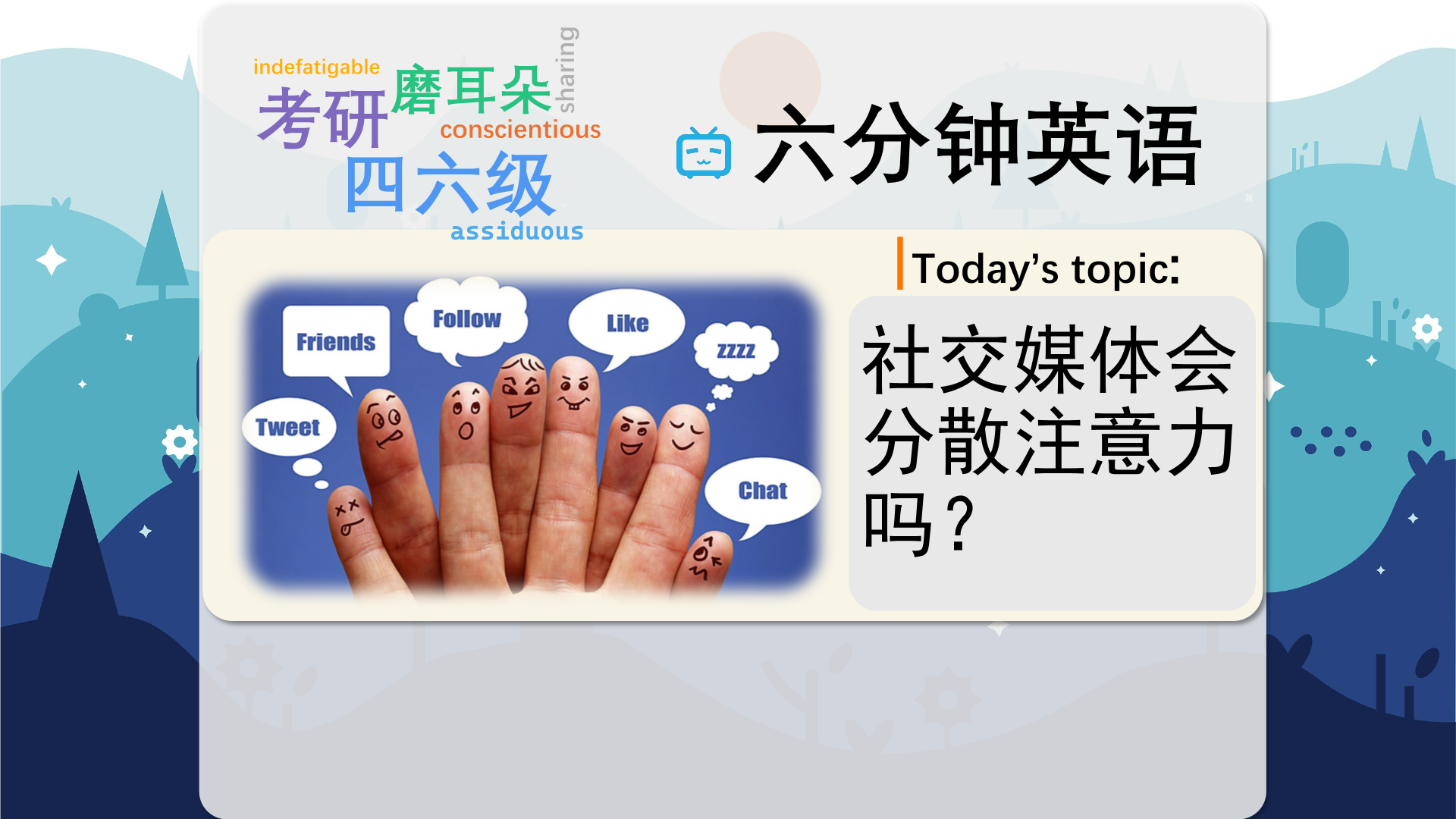
【英文脚本】
Sophie
Hello and welcome to 6 Minute English. I’m Sophie…
Sophie
Neil? … Neil!
Neil
Oh, sorry! … And I’m Neil.
Sophie
Neil, please put down your phone. We’re doing the show!
Neil
Yeah, I know. Hang on a minute. I just need to tweet something and… Done!
Sophie
And the subject of today’s show is social media and its impact on our daily lives.
Neil
Hmm, well, I suppose it has had quite a big impact on mine.
Sophie
That’s all too clear. Now, perhaps we can move on to today’s quiz question?
Neil
Of course, I’m all ears. [sound of a smartphone] Oh, hang on, wait a second…
Sophie
There’s a word to describe what you’re doing, you know. Answer me this: Which word describes a situation where you’re talking to someone and they suddenly look down at their phone or answer it? Is it… a) phobbing? b) phibbing? Or c) phubbing?
Neil
Well, you’ve got me there, Sophie! I have no idea! But I’ll guess that it’s c) phubbing!
Sophie
Well, we’ll find out later on in the show whether you got the answer right or not. Now, let’s move on and talk about phone etiquette, etiquette means rules of polite behaviour in society or among people in a certain group.
Neil
Well… interrupting conversations to check your phone has become a social norm, hasn’t it, Sophie?
Sophie
Social norms are the rules of behaviour considered acceptable in a group or society. I don’t agree, Neil! Let’s listen to Professor Sherry Turkle of Massachusetts Institute of Technology talking about social norms amongst students.
Sherry Turkle, American clinical psychologist and professor of the social studies
of Science and Technology at Massachusetts Institute of Technology I interviewed hundreds of college students and what they talked about was what some of them called ‘the rule of three’. And what the rule of three is which is that if you go to dinner with friends, you don’t want to look down at your phone until you see that three people, let’s say you’re six at dinner, are looking up in the conversation. So there’s a new etiquette where you don’t look down unless three people are looking up kind of to keep a little conversation alive.
Neil
Professor Sherry Turkle.
Sophie
Why don’t you try out the rule of three once in a while?
Neil
There are only two of us here, Sophie - do the math! And I’m listening to you… mmm… let me just send a text message here on my phone … hang on…
Sophie
Neil… NEIL! I’m not going to carry on with the show unless you pay attention!
Neil
Sorry, Sophie. Actually I was just doing that to wind you up. I wasn’t really using my phone… Sorry.
Sophie
And to wind someone up means to say or do something deliberately in order to annoy someone. Well, I do get wound up about people constantly checking their devices. Yesterday, I was in a café and two girls came in. They sat down and started chatting away – but not to each other, they were tapping away at their devices. And there was no face-to- face conversation at all!
Neil
But you can have moments of connection using your devices, you know?
Sophie
If you have a connection with someone you engage emotionally.
Neil
Exactly. I was on the train this morning and there were a couple sharing a tablet. They were looking at the screen, and talking about what they saw there. It was very intimate, and they were… well… very connected. Let’s hear from Ian Sinclair, British poet and filmmaker, talking about a new generation of connected humans.
Iain Sinclair, British writer, poet, and filmmaker
Physiologically we’re changing, that almost the neck muscles are tipped over to look down. We’re getting a new kind of human being. And I think, maybe I’m not getting it, but there is actually a different kind of intimacy emerging in which these instruments are very important.
Sophie
So Iain Sinclair says our physiology is changing, our bodies, our neck muscles are changing, to make it easier to look down all the time at our devices! But it isn’t only muscles that might change as a result of our techie habits, it’s the way we interact, or engage with each other too. Ian Sinclair talks about a different kind of intimacy emerging – what does he mean, Neil?
Neil
Our intimacy, or closeness, with other people is somehow connected up with our devices. They’ve become part of us. And I expect some day devices will literally be part of us, an implant in our necks or something.
Sophie
What a horrible thought!
Neil
Let’s have the quiz question again Sophie to take your mind off it.
Sophie
OK. I asked: Which word describes a situation where you’re talking to someone and they suddenly look down at their phone or answer it? Is it…a) phobbing? b) phibbing? Or c) phubbing?
Neil
And I said c) phubbing.
Sophie
You were right, Neil! Well done! It’s a combination of’ ‘phone’ and ‘snubbing’, snub means to deliberately ignore someone you know. New words formed by putting together parts of existing words are known as blends or portmanteau words. And ‘phubbing’ is starting to appear in some online dictionaries. Now can we hear the words we learned today?
Sophie
Neil? OK! I’ll say the words myself: etiquette wind someone up have a connection with someone physiology interact intimacy snub
Sophie
Well, that’s the end of today’s 6 Minute English. Don’t forget to connect with us again soon! Come on Neil, connect with us! Come on!
Neil
Oh, yeah, hang on, just got to…
Sophie
Goodbye!
Neil
Hang on… I’ll be with you in a second… Yes. OK. Bye!
【中英文双语脚本】
Sophie(苏菲)
Hello and welcome to 6 Minute English. I’m Sophie…
您好,欢迎来到 6 Minute English。我是 Sophie…
Sophie(苏菲)
Neil? … Neil!
尼尔?…尼尔!
Neil(尼尔)
Oh, sorry! … And I’m Neil.
哦,对不起!…我是 Neil。
Sophie(苏菲)
Neil, please put down your phone. We’re doing the show!
尼尔,请放下你的电话。我们正在做节目!
Neil(尼尔)
Yeah, I know. Hang on a minute. I just need to tweet something and… Done!
是的,我明白。等一下。我只需要发点东西,然后……做!
Sophie(苏菲)
And the subject of today’s show is social media and its impact on our daily lives.
今天节目的主题是社交媒体及其对我们日常生活的影响。
Neil(尼尔)
Hmm, well, I suppose it has had quite a big impact on mine.
嗯,嗯,我想它对我产生了相当大的影响。
Sophie(苏菲)
That’s all too clear. Now, perhaps we can move on to today’s quiz question?
这太清楚了。现在,也许我们可以继续今天的测验问题?
Neil(尼尔)
Of course, I’m all ears. [sound of a smartphone] Oh, hang on, wait a second…
当然,我全神贯注。[智能手机的声音]哦,等等,等一下……
Sophie(苏菲)
There’s a word to describe what you’re doing, you know. Answer me this: Which word describes a situation where you’re talking to someone and they suddenly look down at their phone or answer it? Is it… a) phobbing? b) phibbing? Or c) phubbing?
你知道的,有一个词可以描述你在做什么。回答我这个问题:哪个词描述了你正在和某人交谈,他们突然低头看手机或接听电话的情况?是吗。。。a) 跳动?b) phibbing?或者 c) 低头?
Neil(尼尔)
Well, you’ve got me there, Sophie! I have no idea! But I’ll guess that it’s c) phubbing!
嗯,你明白了,苏菲!我不知道!但我猜是 c) 低头!
Sophie(苏菲)
Well, we’ll find out later on in the show whether you got the answer right or not. Now, let’s move on and talk about phone etiquette, etiquette means rules of polite behaviour in society or among people in a certain group.
好吧,我们稍后会在节目中发现您是否回答正确。现在,让我们继续谈谈电话礼仪,礼仪是指社会或某个群体中人们之间的礼貌行为规则。
Neil(尼尔)
Well… interrupting conversations to check your phone has become a social norm, hasn’t it, Sophie?
井。。。打断对话查看手机已经成为一种社会常态,不是吗,Sophie?
Sophie(苏菲)
Social norms are the rules of behaviour considered acceptable in a group or society. I don’t agree, Neil! Let’s listen to Professor Sherry Turkle of Massachusetts Institute of Technology talking about social norms amongst students.
社会规范是在一个群体或社会中被认为是可以接受的行为规则。我不同意,尼尔!让我们听听麻省理工学院的 Sherry Turkle 教授谈论学生中的社会规范。
Sherry Turkle, American clinical psychologist and professor of the social studies(SherryTurkle,美国临床心理学家和社会研究教授)
of Science and Technology at Massachusetts Institute of Technology I interviewed hundreds of college students and what they talked about was what some of them called ‘the rule of three’. And what the rule of three is which is that if you go to dinner with friends, you don’t want to look down at your phone until you see that three people, let’s say you’re six at dinner, are looking up in the conversation. So there’s a new etiquette where you don’t look down unless three people are looking up kind of to keep a little conversation alive.
麻省理工学院科学技术学院的我采访了数百名大学生,他们谈论的是他们中的一些人所说的“三法则”。三人法则是,如果你和朋友一起去吃饭,你不想低头看手机,直到你看到三个人,比如你六个人在吃饭,正在抬头看谈话。所以有一种新的礼仪,除非三个人抬头看,否则你不要低头看,以保持一点对话的活力。
Neil(尼尔)
Professor Sherry Turkle.
Sherry Turkle 教授。
Sophie(苏菲)
Why don’t you try out the rule of three once in a while?
你为什么不偶尔尝试一下三规则呢?
Neil(尼尔)
There are only two of us here, Sophie - do the math! And I’m listening to you… mmm… let me just send a text message here on my phone … hang on…
我们这里只有两个人,Sophie - 算一算吧!我正在听你说……嗯。。。让我在我的手机上发一条短信……坚持。。。
Sophie(苏菲)
Neil… NEIL! I’m not going to carry on with the show unless you pay attention!
尼尔。。。尼尔!除非你注意,否则我不会继续演出!
Neil(尼尔)
Sorry, Sophie. Actually I was just doing that to wind you up. I wasn’t really using my phone… Sorry.
对不起,Sophie。其实我这样做只是为了让你舒服些。我真的没有用我的手机……不好意思。
Sophie(苏菲)
And to wind someone up means to say or do something deliberately in order to annoy someone. Well, I do get wound up about people constantly checking their devices. Yesterday, I was in a café and two girls came in. They sat down and started chatting away – but not to each other, they were tapping away at their devices. And there was no face-to- face conversation at all!
而 to winding someone up 的意思是故意说或做某事,以惹恼某人。好吧,我确实对人们不断检查他们的设备感到不安。昨天,我在一家咖啡馆里,两个女孩进来了。他们坐下来开始聊天 —— 但不是彼此聊天,而是在窃听他们的设备。而且根本没有面对面的交谈!
Neil(尼尔)
But you can have moments of connection using your devices, you know?
但是您可以使用您的设备获得连接时刻,您知道吗?
Sophie(苏菲)
If you have a connection with someone you engage emotionally.
如果你与你在情感上参与的人有联系。
Neil(尼尔)
Exactly. I was on the train this morning and there were a couple sharing a tablet. They were looking at the screen, and talking about what they saw there. It was very intimate, and they were… well… very connected. Let’s hear from Ian Sinclair, British poet and filmmaker, talking about a new generation of connected humans.
完全。今天早上我在火车上,有一对夫妇共用一台平板电脑。他们看着屏幕,谈论他们在那里看到的东西。这非常亲密,他们……井。。。联系紧密。让我们听听英国诗人和电影制作人 Ian Sinclair 谈论新一代互联人类的故事。
Iain Sinclair, British writer, poet, and filmmaker(伊恩·辛克莱,英国作家、诗人和电影制片人)
Physiologically we’re changing, that almost the neck muscles are tipped over to look down. We’re getting a new kind of human being. And I think, maybe I’m not getting it, but there is actually a different kind of intimacy emerging in which these instruments are very important.
从生理上讲,我们正在发生变化,几乎颈部肌肉会倾斜以向下看。我们正在得到一种新的人。我想,也许我没有明白,但实际上出现了一种不同的亲密关系,其中这些工具非常重要。
Sophie(苏菲)
So Iain Sinclair says our physiology is changing, our bodies, our neck muscles are changing, to make it easier to look down all the time at our devices! But it isn’t only muscles that might change as a result of our techie habits, it’s the way we interact, or engage with each other too. Ian Sinclair talks about a different kind of intimacy emerging – what does he mean, Neil?
所以 Iain Sinclair 说,我们的生理机能正在发生变化,我们的身体、颈部肌肉正在发生变化,让我们更容易一直低头看我们的设备!但是,不仅肌肉可能会因我们的技术习惯而发生变化,我们互动或互动的方式也会发生变化。Ian Sinclair 谈到了一种不同的亲密关系正在出现 —— Neil 他是什么意思?
Neil(尼尔)
Our intimacy, or closeness, with other people is somehow connected up with our devices. They’ve become part of us. And I expect some day devices will literally be part of us, an implant in our necks or something.
我们与他人的亲密关系或亲密程度以某种方式与我们的设备相关联。他们已经成为我们的一部分。我预计有一天设备会真正成为我们的一部分,成为我们脖子上的植入物或其他东西。
Sophie(苏菲)
What a horrible thought!
多么可怕的想法!
Neil(尼尔)
Let’s have the quiz question again Sophie to take your mind off it.
让我们再次提出测验问题,Sophie,让你的注意力从它上移开。
Sophie(苏菲)
OK. I asked: Which word describes a situation where you’re talking to someone and they suddenly look down at their phone or answer it? Is it…a) phobbing? b) phibbing? Or c) phubbing?
还行。我问道:哪个词可以描述你正在和某人交谈,他们突然低头看手机或接电话的情况?是吗。。。a) 跳动?b) phibbing?或者 c) 低头?
Neil(尼尔)
And I said c) phubbing.
我说 c) 低头。
Sophie(苏菲)
You were right, Neil! Well done! It’s a combination of’ ‘phone’ and ‘snubbing’, snub means to deliberately ignore someone you know. New words formed by putting together parts of existing words are known as blends or portmanteau words. And ‘phubbing’ is starting to appear in some online dictionaries. Now can we hear the words we learned today?
你是对的,尼尔!干的好!它是 ‘ ‘phone’ 和 ‘snubing’ 的组合,snub 的意思是故意忽视你认识的人。通过将现有单词的部分组合在一起而形成的新单词称为混合词或组合词。“phubbing”开始出现在一些在线词典中。现在我们能听到今天学到的话语吗?
Sophie(苏菲)
Neil? OK! I’ll say the words myself: etiquette wind someone up have a connection with someone physiology interact intimacy snub
尼尔?还行!我自己说这些话: 礼仪 缠绕 某人 与某人建立联系 生理 互动 亲密关系 冷落
Sophie(苏菲)
Well, that’s the end of today’s 6 Minute English. Don’t forget to connect with us again soon! Come on Neil, connect with us! Come on!
好了,今天的六分钟 English 到此结束。别忘了尽快再次与我们联系!来吧 Neil,与我们联系!加油!
Neil(尼尔)
Oh, yeah, hang on, just got to…
哦,对了,等等,刚才得……
Sophie(苏菲)
Goodbye!
再见!
Neil(尼尔)
Hang on… I’ll be with you in a second… Yes. OK. Bye!
坚持。。。我一会儿就和你在一起……是的。好,再见!

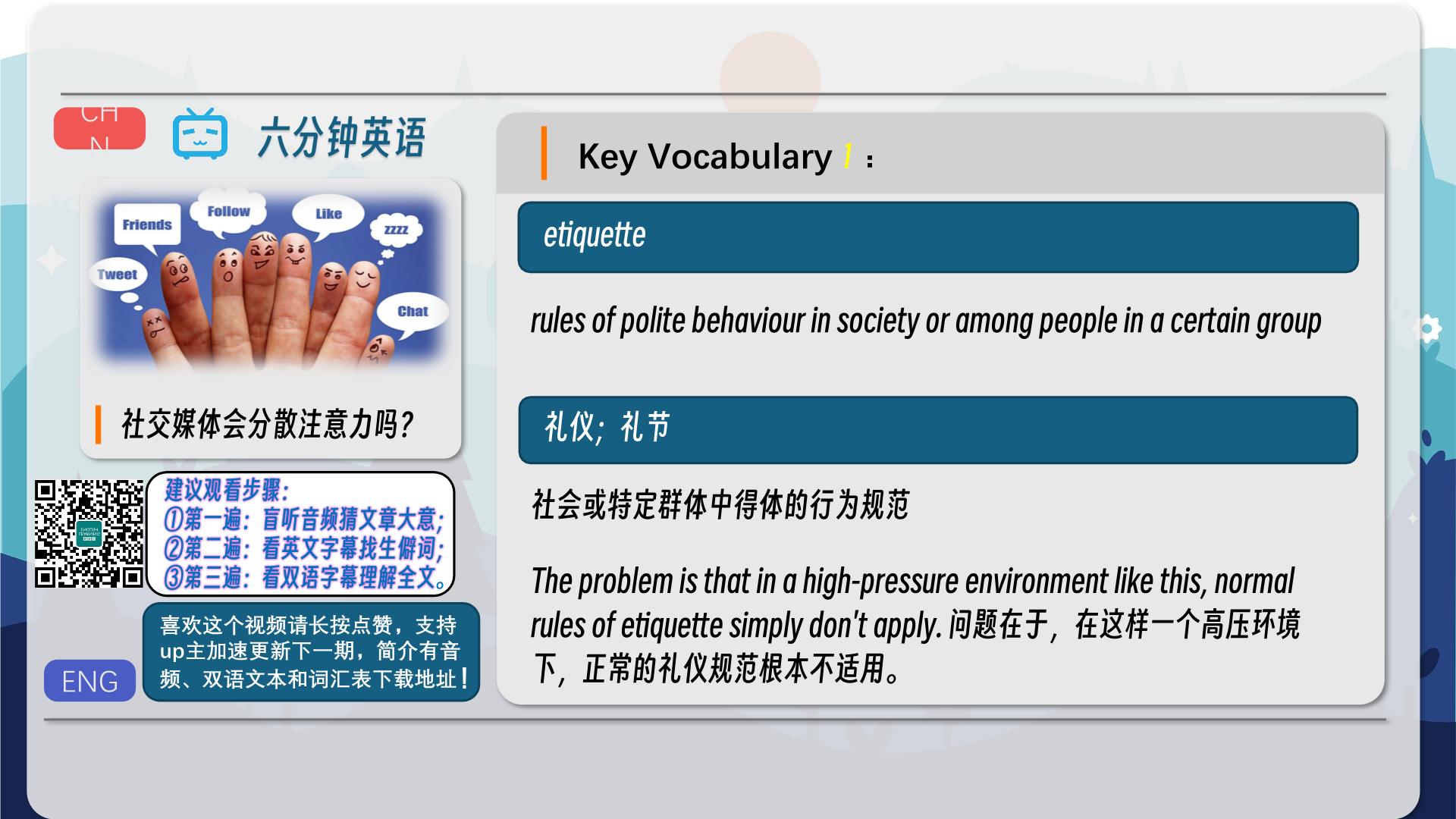
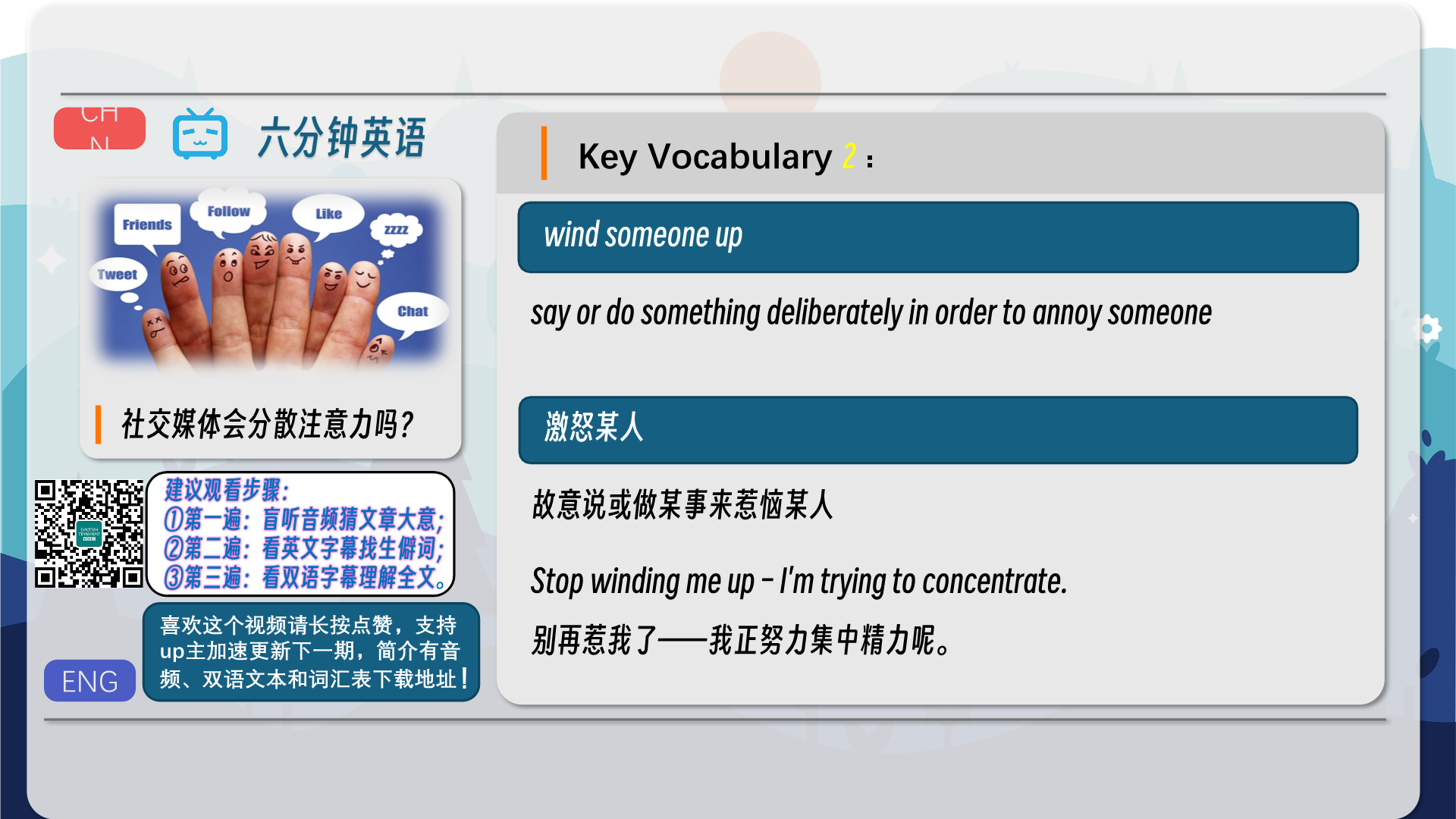
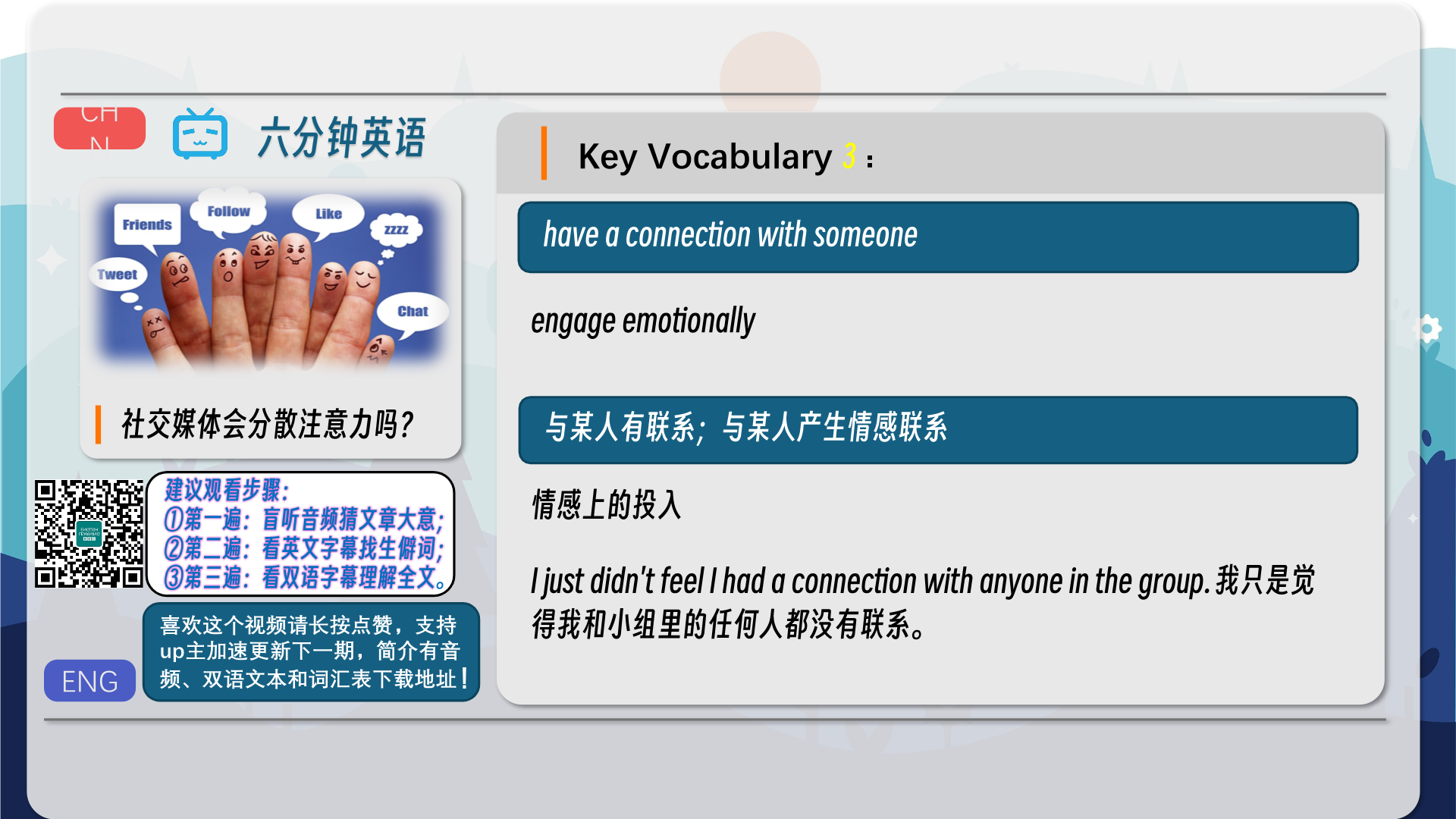
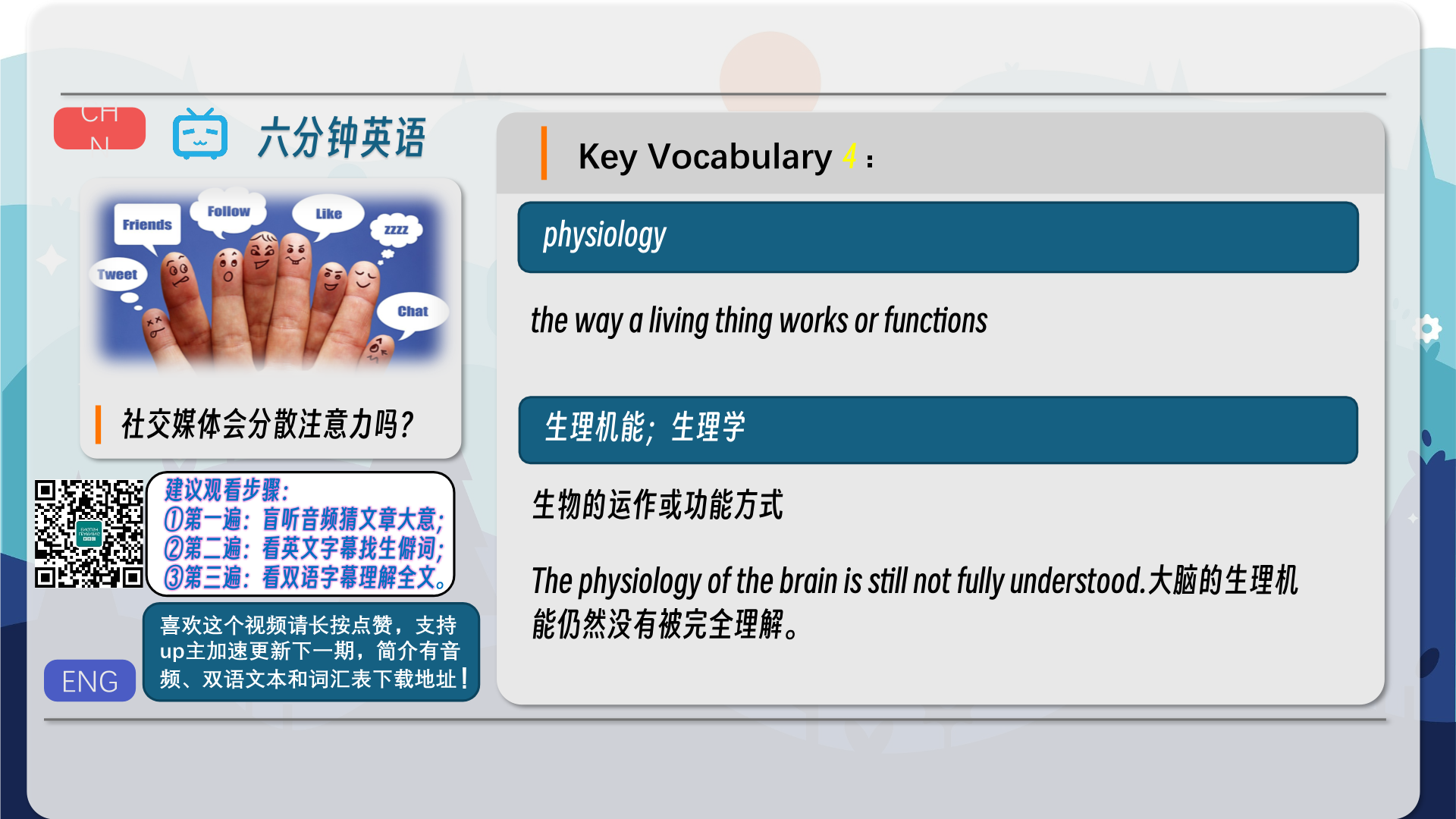
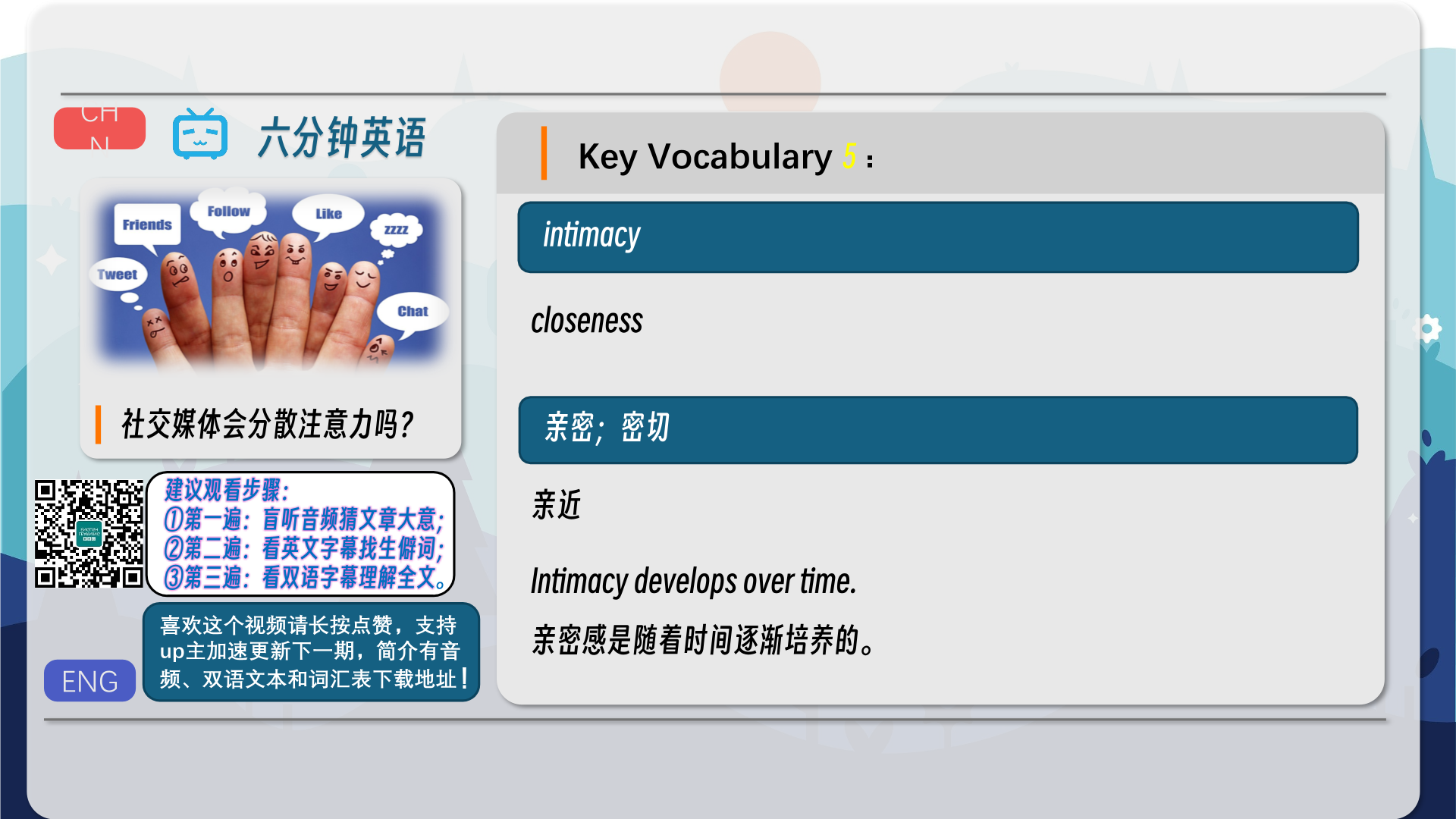
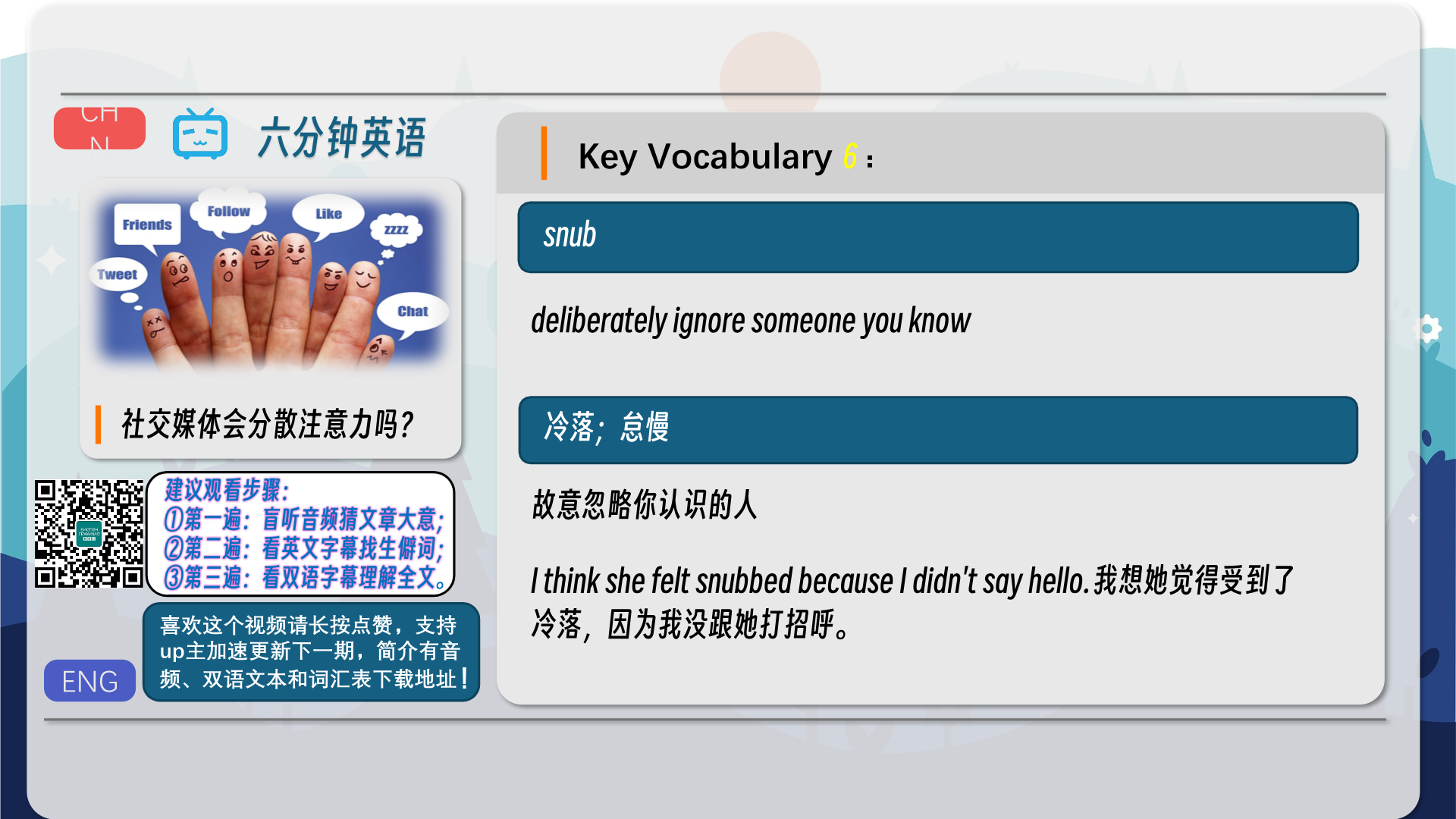
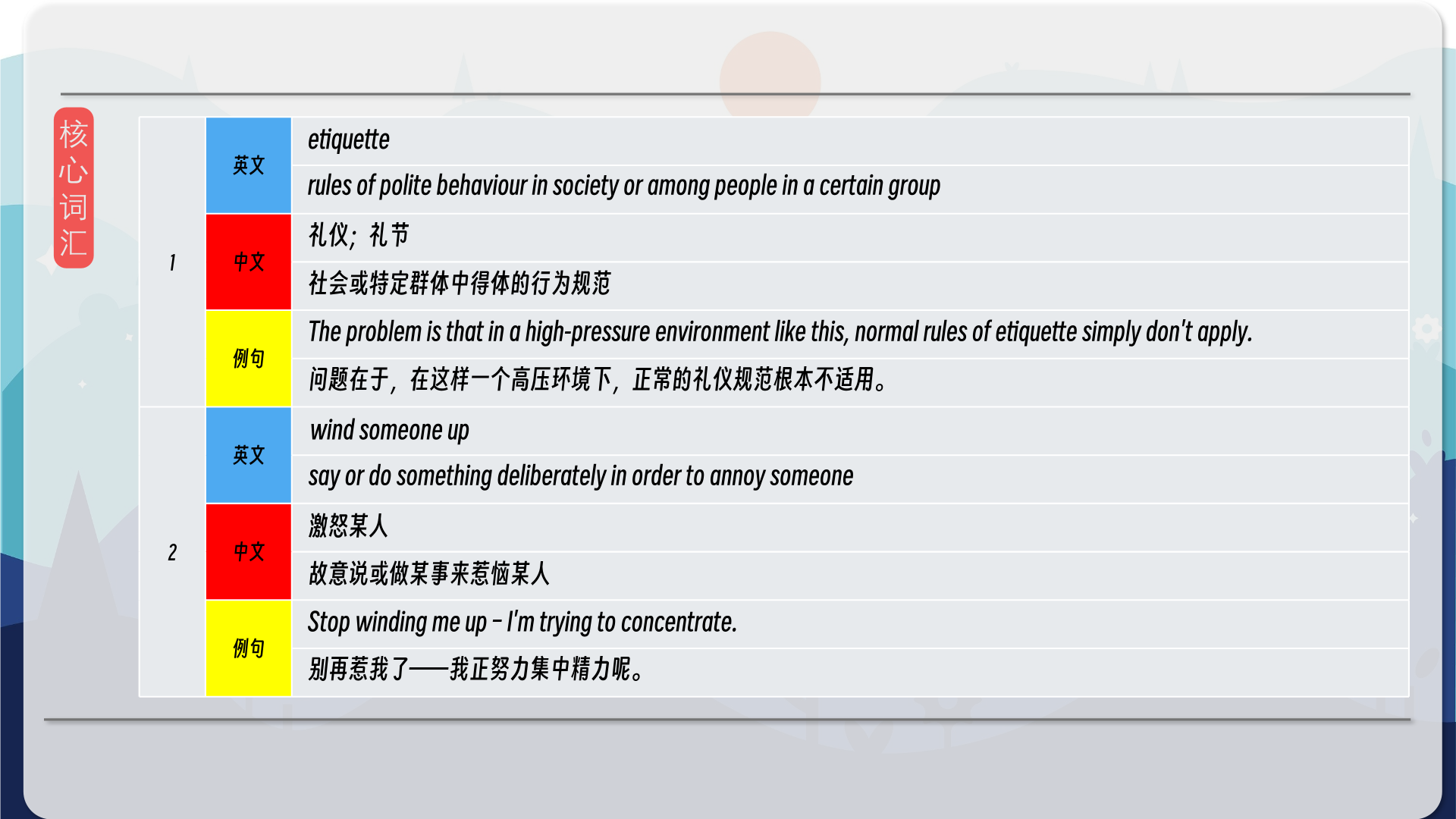
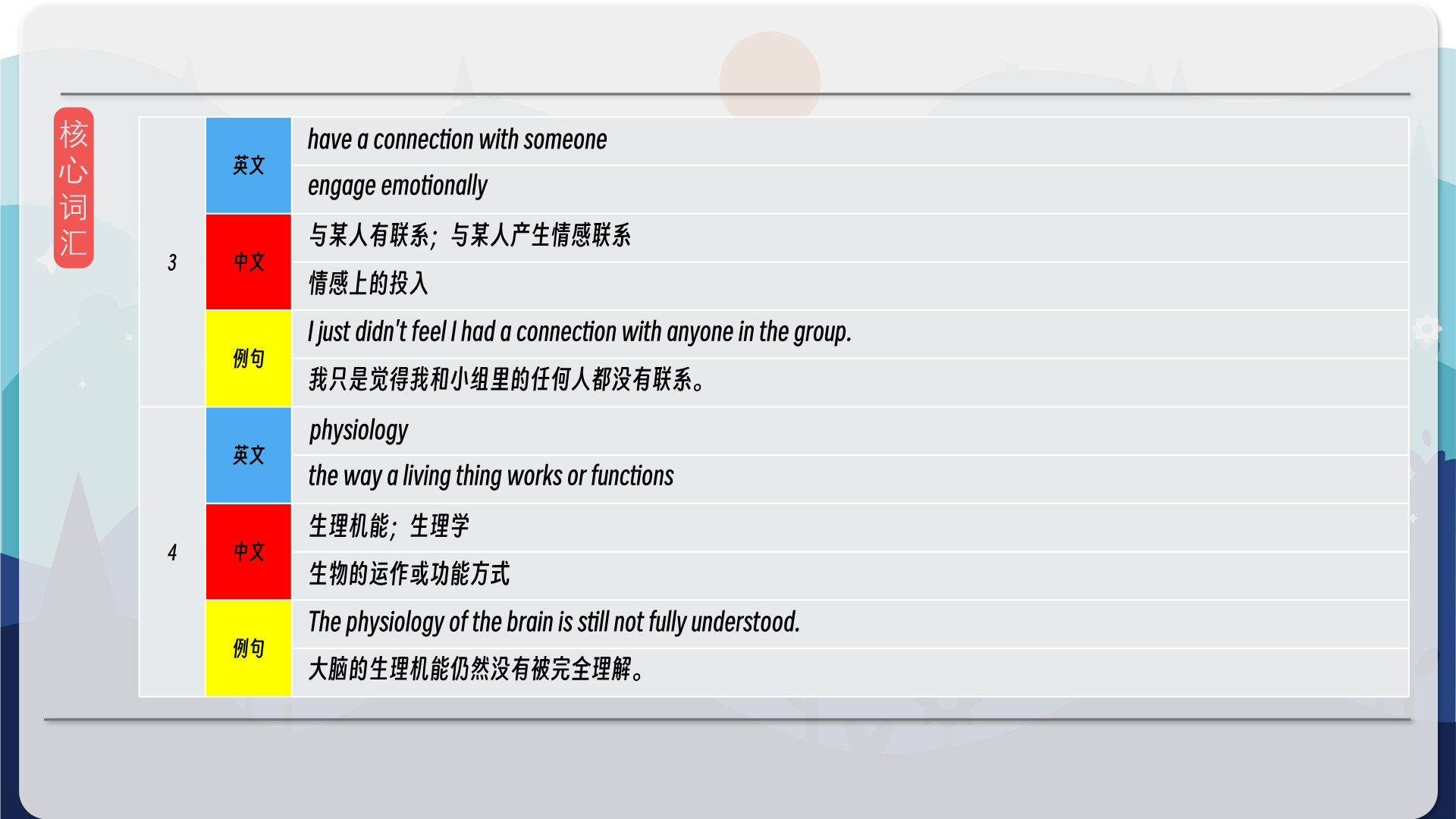
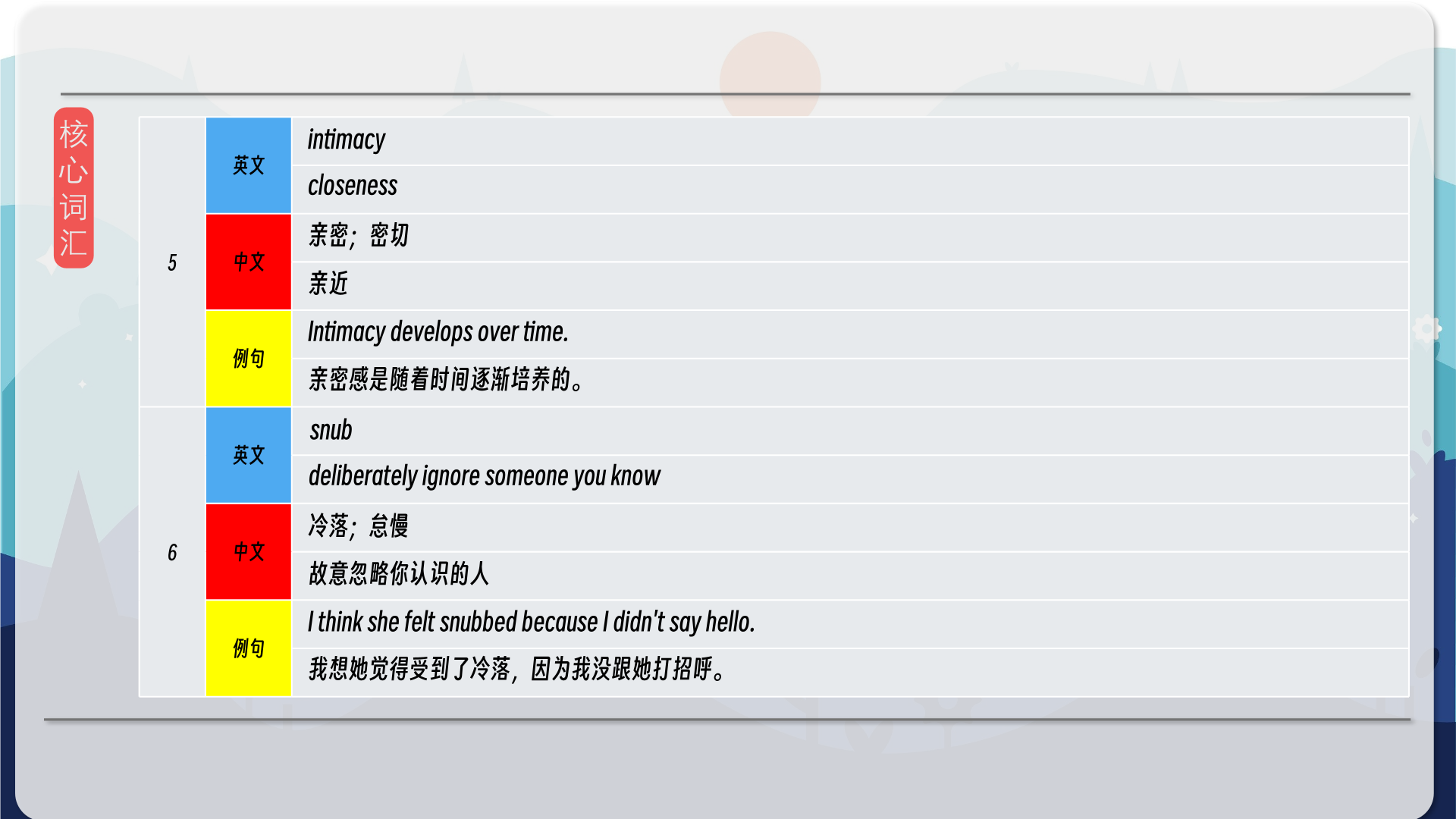
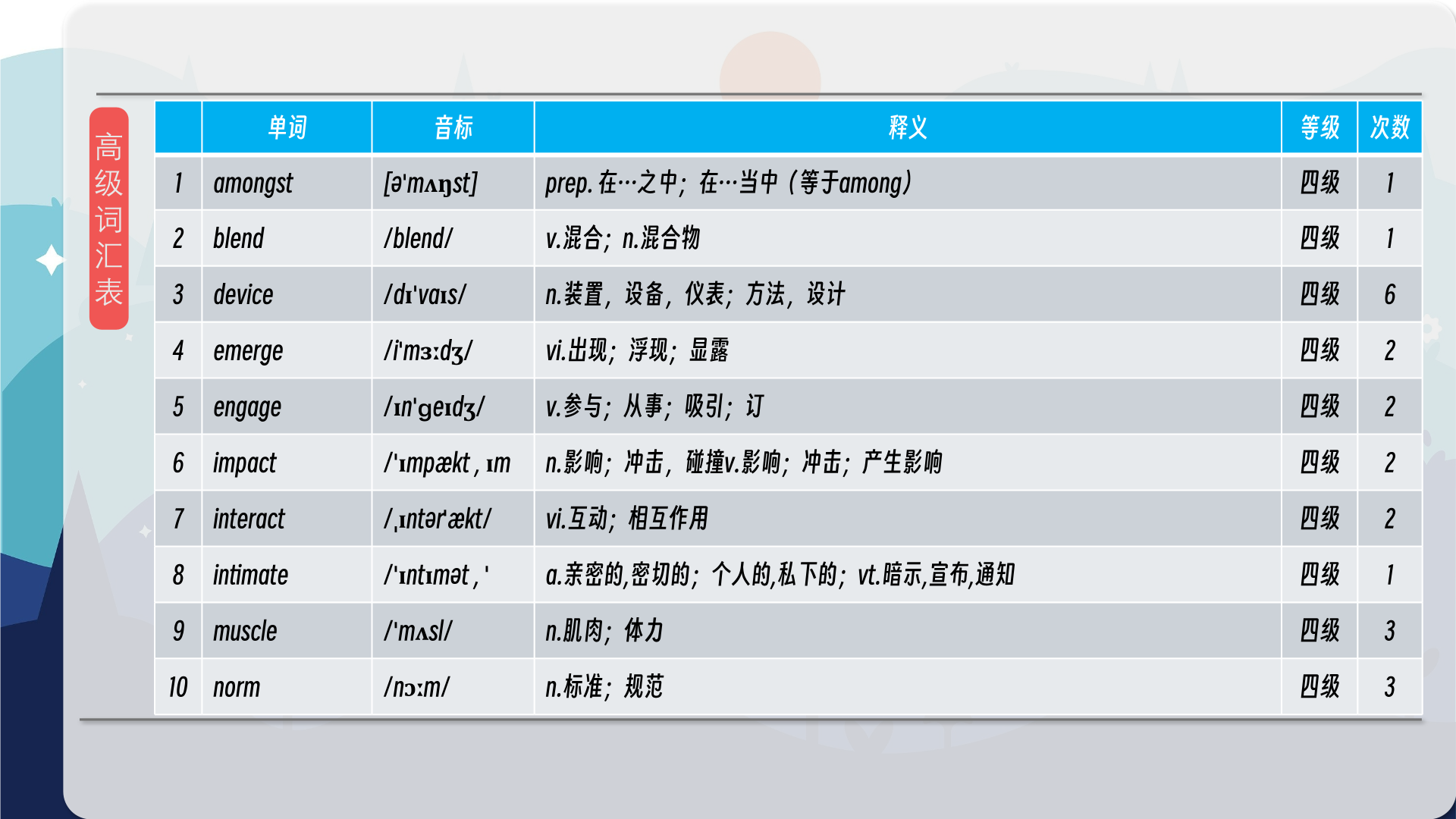
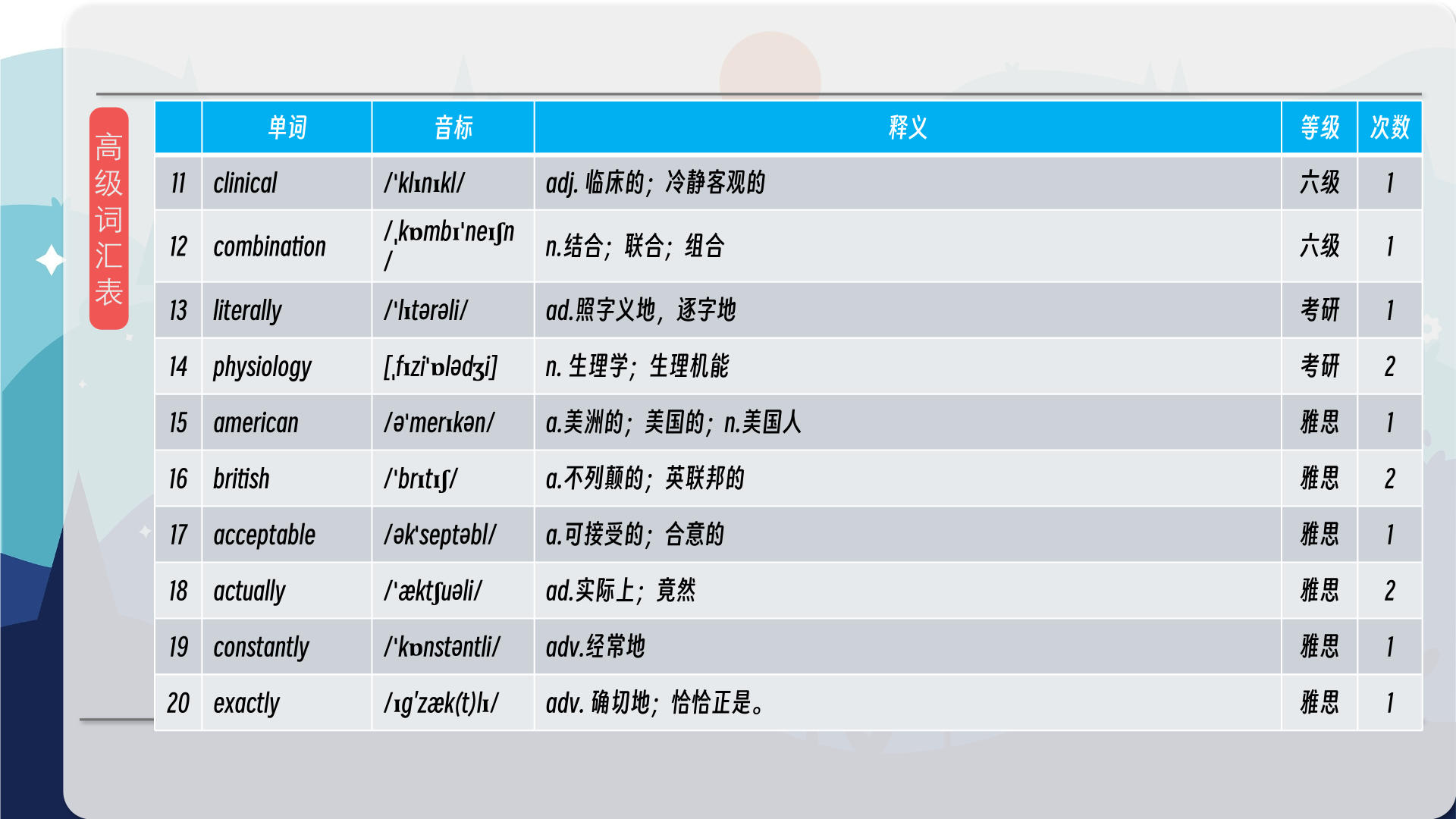
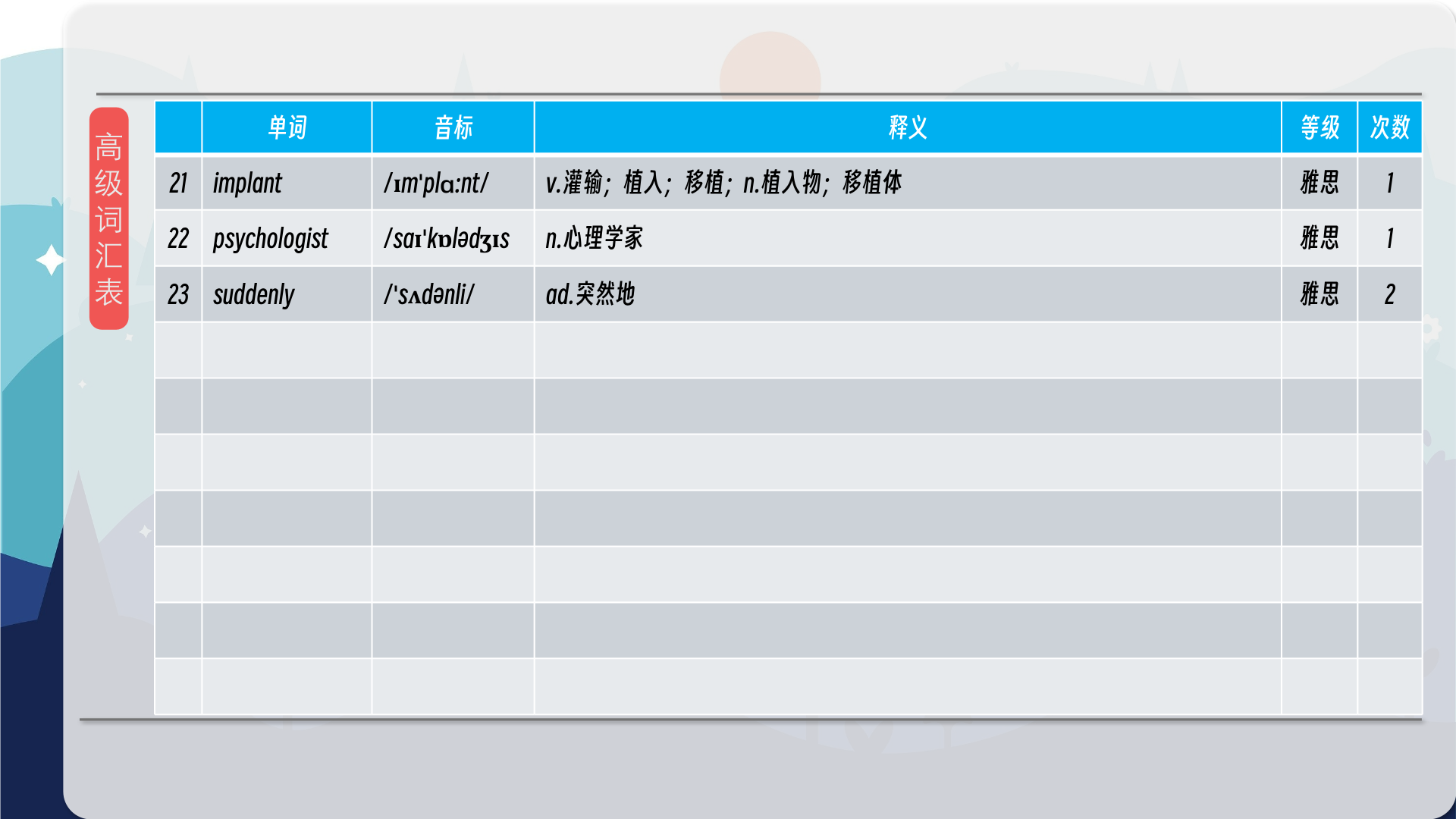

【核心词汇】
etiquette
rules of polite behaviour in society or among people in a certain group
礼仪;礼节
社会或特定群体中得体的行为规范
The problem is that in a high-pressure environment like this, normal rules of etiquette simply don’t apply.
问题在于,在这样一个高压环境下,正常的礼仪规范根本不适用。
wind someone up
say or do something deliberately in order to annoy someone
激怒某人
故意说或做某事来惹恼某人
Stop winding me up – I’m trying to concentrate.
别再惹我了——我正努力集中精力呢。
have a connection with someone
engage emotionally
与某人有联系;与某人产生情感联系
情感上的投入
I just didn’t feel I had a connection with anyone in the group.
我只是觉得我和小组里的任何人都没有联系。
physiology
the way a living thing works or functions
生理机能;生理学
生物的运作或功能方式
The physiology of the brain is still not fully understood.
大脑的生理机能仍然没有被完全理解。
intimacy
closeness
亲密;密切
亲近
Intimacy develops over time.
亲密感是随着时间逐渐培养的。
snub
deliberately ignore someone you know
冷落;怠慢
故意忽略你认识的人
I think she felt snubbed because I didn’t say hello.
我想她觉得受到了冷落,因为我没跟她打招呼。
在公众号里输入6位数字,获取【对话音频、英文文本、中文翻译、核心词汇和高级词汇表】电子档,6位数字【暗号】在文章的最后一张图片,如【220728】,表示22年7月28日这一期。公众号没有的文章说明还没有制作相关资料。年度合集在B站【六分钟英语】工房获取,每年共计300+文档,感谢支持!